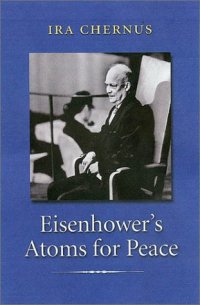
Ebook: Eisenhower's Atoms for Peace
Author: Ira Chernus
- Series: Library of Presidential Rhetoric
- Year: 2002
- Publisher: Texas A&M University Press
- Edition: 1
- Language: English
- pdf
In his Atoms for Peace” speech of 1953, President Dwight David Eisenhower captured the tensionsand the ironiesof the atomic age. While nuclear devastation threatened all nations, Eisenhower believed only nuclear preparedness offered protection; while nuclear weapons loomed as the ultimate war cloud, nuclear power offered progress and hope.
In this thought-provoking consideration of Eisenhower’s speech and others leading up to it, Ira Chernus views the Atoms for Peace” speech, presented to the General Assembly of the United Nations, not merely as a legitimation of American foreign policy but as itself an act of policy. Indeed, he frames the policy in a new interpretation of Eisenhower’s broad discursive goal, which he calls apocalypse management,” a plan to allow the United States to manage threats and crises around the world.
Chernus sheds new light on the internal consistency of Eisenhower’s thought, which many observers have found inconsistent, as well as on the ways in which the president’s rhetoric backed him into a policy corner he had not intended to occupy. Chernus also reviews the domestic impact of the speech through a detailed examination of media interpretations in the United States.
This tightly reasoned, clearly written study offers a new understanding of the evolution of cold war nuclear policy, the power of presidential rhetoric, and the political understanding of America’s man of peace,” Dwight David Eisenhower. The full text of Eisenhower's speech is presented in the text. Those interested in American foreign policy will find it compelling reading; scholars and students will find it challenging and rewarding analysis.
In this thought-provoking consideration of Eisenhower’s speech and others leading up to it, Ira Chernus views the Atoms for Peace” speech, presented to the General Assembly of the United Nations, not merely as a legitimation of American foreign policy but as itself an act of policy. Indeed, he frames the policy in a new interpretation of Eisenhower’s broad discursive goal, which he calls apocalypse management,” a plan to allow the United States to manage threats and crises around the world.
Chernus sheds new light on the internal consistency of Eisenhower’s thought, which many observers have found inconsistent, as well as on the ways in which the president’s rhetoric backed him into a policy corner he had not intended to occupy. Chernus also reviews the domestic impact of the speech through a detailed examination of media interpretations in the United States.
This tightly reasoned, clearly written study offers a new understanding of the evolution of cold war nuclear policy, the power of presidential rhetoric, and the political understanding of America’s man of peace,” Dwight David Eisenhower. The full text of Eisenhower's speech is presented in the text. Those interested in American foreign policy will find it compelling reading; scholars and students will find it challenging and rewarding analysis.
Download the book Eisenhower's Atoms for Peace for free or read online
Continue reading on any device:

Last viewed books
Related books
{related-news}
Comments (0)